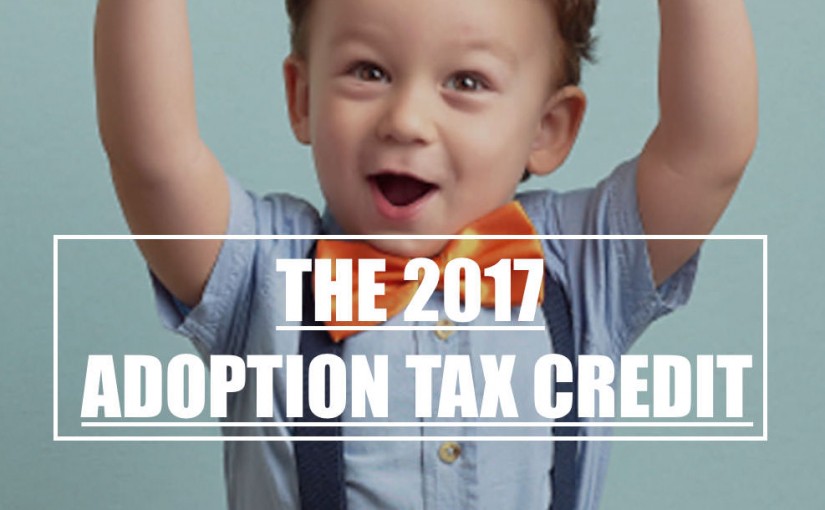The IRS issued Internal Revenue Bulletin: 2016-45 announcing rates for the 2017 Adoption Tax Credit. There are changes, although the credit will work in a similar way to recent years such as 2015 and 2016. When you’re filling out Form 8839 (click here for
Wed 28 Dec, 2016 / by Parker and Parker / Adoption

The IRS issued Internal Revenue Bulletin: 2016-45 announcing rates for the 2017 Adoption Tax Credit. There are changes, although the credit will work in a similar way to recent years such as 2015 and 2016. When you’re filling out Form 8839 (click here for a link to the IRS form) soon for the adoption you finalized in 2016, or in a year for an adoption that you plan to finalize in 2017, here is the information to remember.
Adoption Credit Amount. For taxable years beginning in 2017, under § 23(a)(3) the credit allowed for an adoption of a child with special needs is $13,570. For taxable years beginning in 2017, under § 23(b)(1) the maximum credit allowed for other adoptions is the amount of qualified adoption expenses up to $13,570.
This is different from tax year 2016, when the credit allowed for $13,460 for special needs adoptions, and up to $13,460 for domestic adoptions or international adoptions that are finalized in that tax year.
As Your Income Goes Up, Eligibility to Claim the Full Amount Still Goes Down. In 2017 the available adoption credit begins to phase out under § 23(b)(2)(A) for taxpayers with modified adjusted gross income in excess of $203,540 and is completely phased out for taxpayers with modified adjusted gross income of $243,540 or more.
These numbers are adjusted for 2017 up from the 2016 income thresholds. For tax year 2016, as long as your modified adjusted gross income was $201,920 or less, you can qualify for the full credit. The credit phases out as your income increases and goes away completely when it exceeds $241,920.
To recap, the max amounts in recent years:
2015: $13,400
2016: $13,460
2017: $13,570
Employer Adoption Assistance Programs. Some employers, such as Caterpillar in the Peoria area, have programs that provide adoption expense reimbursement. If you work for a company with an adoption expense program, then the maximum amount that can be excluded from gross income (under § 137(a)(2)) for the adoption of a child with special needs is $13,570.
For private adoptions (non-special needs), it all works similarly. For taxable years beginning in 2017, under § 137(b)(1) the maximum amount that can be excluded from an employee’s gross income for the amounts paid or expenses incurred by an employer for qualified adoption expenses furnished pursuant to the company’s adoption assistance program for other adoptions by the employee is $13,570.
The income phase-out still applies: the amount excludable from an employee’s gross income begins to phase out under § 137(b)(2)(A) for taxpayers with modified adjusted gross income in excess of $203,540 and is completely phased out for taxpayers with modified adjusted gross income of $243,540 or more.
Example: That’s a bit confusing, right? So, for example, if an employer provided adoption reimbursement to an employee in the full and entire amount of $13,570, then (1) the employee of the company has been paid by the company in the same amount as the federal credit, so a federal credit cannot also be claimed, BUT (2) the employee can exclude (deduct) what the company reimburses him/her from gross income when filing taxes.
As another example, let’s use Caterpillar, who pays up to $5,000 in qualified expenses. If an employee completes a domestic adoption, and the expenses are over $13,570 (the cap on the federal credit), then CAT could pay $5,000, and the employee would claim a federal Adoption Tax Credit of $8,570. The $5,000 paid by CAT is excluded from the Adoption Tax Credit, which is reduced by $5,000, but the employee also excludes that amount from gross income. In other words, even though the employer pays an employee $5,000, it’s not taxable income.
The Tax Credit Only Applies to Certain Adoptions. If you adopt your spouse’s child, then the Adoption Tax Credit cannot be claimed for that adoption. It doesn’t apply to private adoptions of a related child. By comparison, if a grandparent adopts a child out of foster care, then the Tax Credit can apply, because it’s not a private adoption – instead, it’s a special needs adoption.
The Adoption Tax Credit Is Specific to Adoption and Different from Other Tax Credits. It is in addition to the credit for child and dependent care expenses (on Form 1040, line 49; Form 1040A, line 31; or Form 1040NR, line 47) and the earned income credit (on Form 1040, line 66a; or Form 1040A, line 42a).
How to Calculate Credits. Bear in mind that the Adoption Tax Credit is no longer refundable. This means that in order to recognize the full benefit of the credit, your total tax must be at least equal to your credit. For example, if your total tax for the year is only $10,000 but you spend $14,000 in qualified adoption expenses, $10,000 is the most you can save in tax. However, it is a credit on what you pay for tax, not a deduction from gross income (like mortgage interest), so it’s much better.
For Private Cases, You May Only Claim Qualified Adoption Expenses. If you’ve completed a domestic private adoption or international adoption, then you may claim reasonable expenses associated with the adoption – such as agency fees, travel/transportation expenses connected with the adoption, legal fees, and court costs. An example: if your adoption has $5,000 in legal fees, $2,000 in agency fees, and $900 in birth parent living expenses and counseling, and that’s the entirety of your adoption-related expenses, then you would receive a credit of $7,900, NOT the entire $13,460 amount. That’s because you only receive a credit for expenses that you actually incur. It’s also important to be careful in keeping accurate records and proof, because historically a large number of tax returns with the credit have been audited.
We understand that these laws can be confusing, but they’re important: the Adoption Tax Credit can be an important means of recouping expenses in adopting your child.


